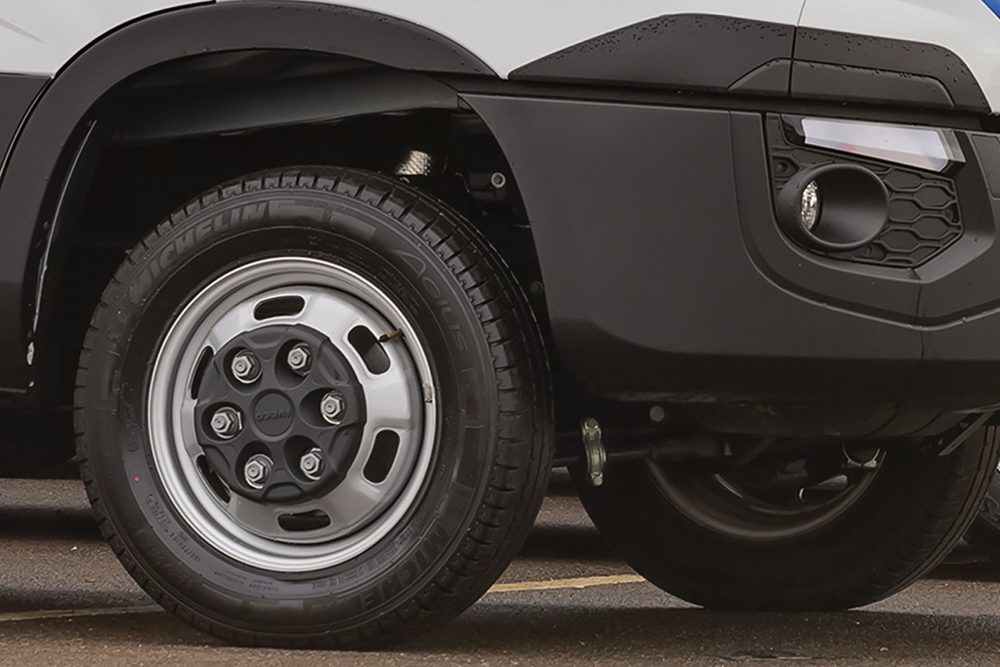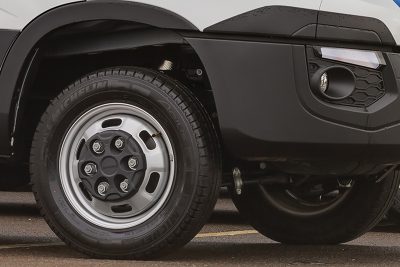Michelin has issued special guidance for firms parking fleets of cars and vans for extended periods during the COVID-19 pandemic.
Brian Porteous, Michelin’s Technical Manager – Car, Van, 4×4 and Government Contracts, has detailed steps to follow before laying up vehicles, along with advice on periodic inspections and preparing assets to re-enter service.
He advises: “Tyres can be damaged if certain precautions are not taken before the weight of a parked car or light commercial is supported for long periods, so it’s important owners follow some basic advice to ensure vehicles can be quickly put back into operation when normal business resumes, and without the need to replace tyres unnecessarily.
“This isn’t just advice for big fleets; it’s as important for smaller operators and sole traders too.”
Preparing vehicles
Before laying up a car or van, the tyres should be checked for damage and any cuts or penetrations that may deteriorate over time should be assessed by an expert. Many tyre dealerships remain open, often with mobile technicians available for supporting fleet business.
Inflation pressures should be set at the normal levels for the vehicle. Any tyre which is found to be under-inflated by up to 7psi can normally be re-inflated safely if there are no obvious signs of damage. However, if a tyre is under-inflated by more than 7psi, it should be removed and inspected by an expert to make sure that no structural damage has been caused.
Tyres inflated with nitrogen should have their inflation pressure checked in just the same way as those inflated with air. Whatever the inflation medium, ensure that a valve cap with a rubber seal is fitted to every tyre valve.
Make sure that tyres are not parked on stones or objects that might dig in. Also avoid tyres sitting sitting for long periods in pools of water or other liquids, such as oils. For longer periods, covering tyres to avoid exposure to sunlight will also prolong their life.
Clean tyres with mild detergent only and rinse well with cold water.
During extended parking
Even when not in use, tyre inflation pressures should still be regularly checked and corrected as necessary – ideally on a monthly basis, in line with standard Michelin recommendations. Any pressure loss should be investigated and the cause remedied.
Every four months, if a vehicle has not been moved, the tyres should be rotated a quarter turn.
Re-entry into service
Any tyre and wheel assembly which has been stored for a long period, on or off the vehicle, should be visually inspected for damage and any unusual signs before re-entering service. Pressures should be checked and set to the vehicle manufacturer’s recommendation.
Remember that tyres may reach the end of their service life whilst in storage. Tyres which have been in use for five years or more should continue to be inspected by a specialist at least annually. Any tyres in service 10 years or more from the date of manufacture, including spare tyres, should be replaced with new tyres as a simple precaution – even if they still appear serviceable and have not reached the legal wear limit.
The date when a tyre was manufactured is located on the sidewall. Consumers should locate the code which begins with the letters DOT. A DOT code ending in “2210” indicates a tyre made in the 22nd week (May) of 2010.
Commenting on the advice, Porteous says: “We appreciate that for most businesses, the very idea of parking vehicles for extended periods is an unfamiliar process and not something they want to be doing. However, by spending a few minutes inspecting and preparing a vehicle first, you will help to protect the condition of its tyres and ensure it is in the best possible condition for getting back to work when the time comes.”
Firms seeking further tyre advice are encouraged to contact their local Michelin Quality Centre or visit www.michelin.co.uk.
Ends
Michelin, the leading mobility company, is dedicated to enhancing its clients’ mobility, sustainably; designing and distributing the most suitable tyres, services and solutions for its clients’ needs; providing digital services, maps and guides to help enrich trips and travels and make them unique experiences; and developing high-technology materials that serve a variety of industries. Headquartered in Clermont-Ferrand, France, Michelin is present in 170 countries, has more than 127,000 employees and operates 69 tyre production facilities which together produced around 200 million tyres in 2019. (www.michelin.com)
For further press information please contact:
David Johnson, Michelin Press Office
Tel: + 44 (0) 1782 402341 Email: d.johnson@michelin.com
Dan Jones or James Keeler, Garnett Keeler PR, Inver House, 37-39 Pound Street,
Carshalton, Surrey, SM5 3PG
Tel: +44 (0)20 8647 4467 E-mail: dan.jones@garnettkeeler.com / james.keeler@garnettkeeler.com
MICHF/318/20




